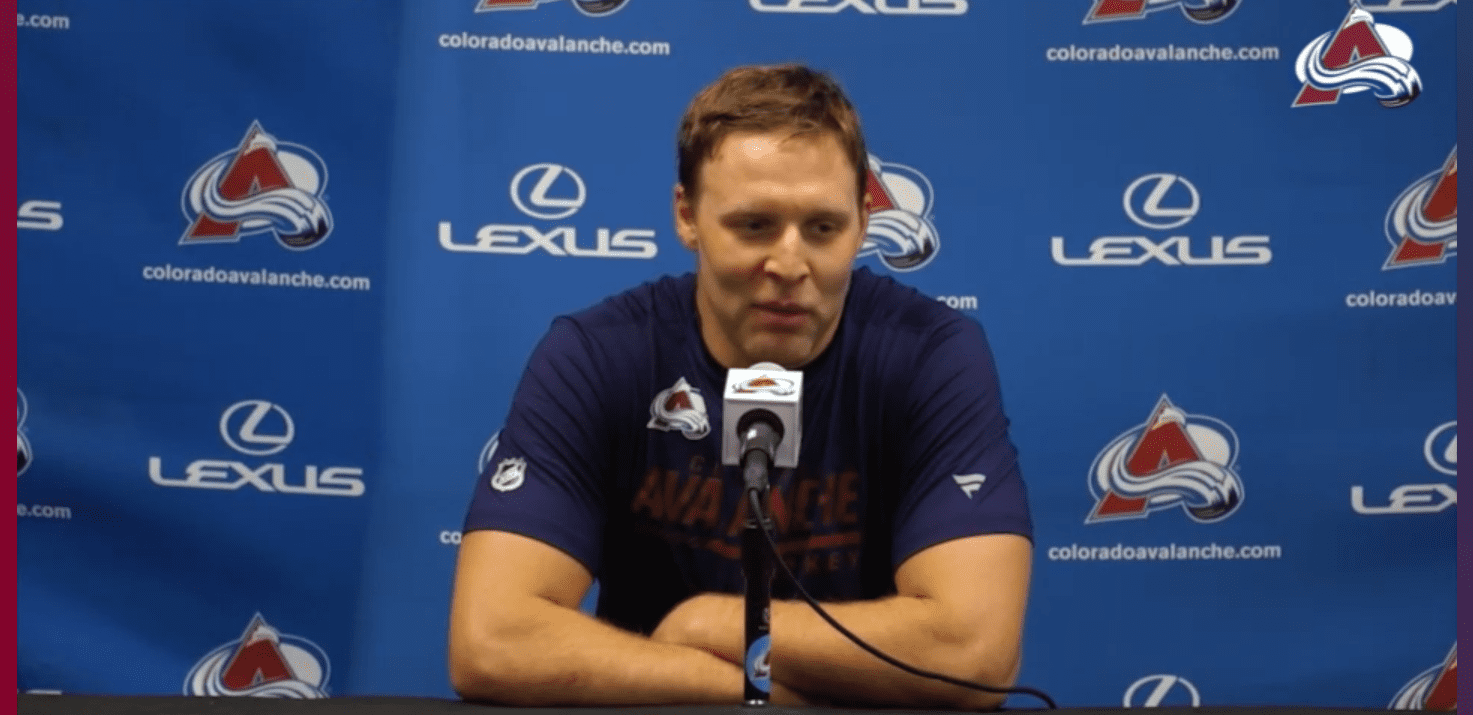Colorado Avalanche
Frei: Jack Johnson is Colorado Avalanche Masterton Trophy nominee

The Colorado chapter of the Professional Hockey Writers Association — an organization I served for many years as a chapter chair and a vice president — has named Avalanche defenseman Jack Johnson its nominee for the Bill Masterton Memorial Trophy for this season.
The award is supposed to go to the player who best exemplifies “perseverance, sportsmanship and dedication to hockey.” Each PHWA chapter nominates one player from its local franchise for an organization-wide vote. Disclosure: My vote in the chapter poll was for defenseman Erik Johnson, but Jack Johnson is deserving, too.
Jack, an Indianapolis native and former Michigan Wolverine who turned 35 in January, seemed to be done in the NHL following the 2020-21 season after stints with Los Angeles, Columbus, Pittsburgh and the New York Rangers. But he came to the Avalanche’s training camp on a PTO (Professional Tryout) agreement and ended up making the team.
He has played 73 games this season for Colorado, often in a tandem with Erik Johnson, and has been mostly steady while contributing veteran stability. He is averaging 16:24 of ice time, is a plus-5 and has one goal and eight assists.
One Colorado player has won the Masterton.
(Final Jeopardy theme.)
Give up?
It was Colorado Rockies goaltender Glenn “Chico” Resch in 1981-82, the team’s final season in Denver before its sale and move to New Jersey.
So who was Bill Masterton? It’s usually pointed out that the Winnipeg native had played for the Minnesota North Stars, but only rarely that he also had been a University of Denver Pioneer. In fact, he was the star of the DU teams that won back-to-back NCAA titles in 1960 and ’61.
In the early hours of January 15, 1968, the North Stars center died at a suburban Minneapolis hospital of a severe brain injury after he was checked and fell backwards, and his head hit the ice in a January 13 game against the Oakland Seals.
He was only 29.
After his DU career, he played in the Canadiens’ system. He then retired from pro hockey came back to DU to get his master’s degree in finance. While living in Minneapolis and working for Honeywell as a contracts administrator, he regained his amateur status to play several seasons of senior hockey and — as a naturalized U.S. citizen — also serve as the captain of the U.S. national team. He was the first player the North Stars signed.
Looking back at the contemporary newspaper accounts of his injury and death, it’s striking how respected he was, and how he was one of the prime examples of terrific players who couldn’t break through in the six-team era and got a chance after the expansion from six to 12 teams for 1967-68.
“Billy was fulfilling a life-long dream,” North Stars general manager Wren Blair said that week. “He did not need the National Hockey League. It was just something he wanted to do.”
The death brought renewed calls to make helmets mandatory in the NHL, including from players association head Alan Eagleson.
In conjunction with the NHL All-Star Game in Toronto, the day after Masterton’s death, league president Clarence Campbell was asked about it.
“It’s an optional thing,” Campbell said. “There are some players who just won’t wear them.”
In fact, Masterton wore a helmet in his collegiate career at DU, because they were mandatory in NCAA hockey, then went without as a pro.
Shockingly, Masterton’s family was in line to get only $50,000 from the NHL’s life insurance program, $10,000 from the league’s accident insurance, $25,000 from Minnesota Workman’s Compensation and roughly $15,000 from the remainder of his contract, which the North Stars said they would honor.
The NHL’s benefit of $10,000 in accident insurance was scheduled to be increased to a $100,000 double indemnity payment on February 1 — two weeks after his death.
“It is sad to think that this wasn’t in effect the day before yesterday,” Campbell said. “But we’ve done this as expeditiously as possible.”
Campbell shot down the idea that the league could play a benefit game to raise money for the family.
“I think a benefit game is asking the public to pay for a normal hazard in our business,” Campbell, a true dinosaur, said. “It is our own responsibility to pay indemnification whenever it is necessary. You can’t compensate for a man’s death no matter what you do. This is just a built-in hazard of our business.”
Pittsburgh Penguins GM Jack Riley pointed out an irony at the All-Star game festivities.
“The first All-Star game in 1934 in Toronto was held for a man, Ace Bailey, who almost lost his life because of a severe head injury,” Riley said
Campbell wasn’t swayed by that.
Later, others involved with the North Stars speculated and cited anecdotal evidence he had had brain hemorrhage issues before that fateful game, but had played through them. That’s what you did in those days. And not just in hockey. The Toronto Star first laid out those details in 2011.
After that 1967-68 season, Claude Provost of the Canadiens was named the first Masterton Memorial Trophy winner.
Oskar Lindblom of the Flyers won the award last season. Here’s a full list of winners. Several winners played for the Avalanche or Rockies, but were with other teams when honored. That list includes Craig Anderson, Ian Laperriere, Jose Theodore, Teemu Selanne and Lanny McDonald.
Former Avalanche coach Tony Granato was the award’s winner when playing for the Sharks. He had come back from undergoing brain surgery after suffering a frightening head injury when with the Kings in a 1986 game against Hartford.
DU’s MVP award also is named after Masterton.
Terry Frei (terry@terryfrei.com, @tfrei) is a Denver-based author and journalist. He has been named a state’s sportswriter of the year seven times in peer voting — four times in Colorado and three times in Oregon. His seven books include the novels “Olympic Affair” and “The Witch’s Season.” Among his five non-fiction works are “Horns, Hogs, and Nixon Coming,” “Third Down and a War to Go,” “March 1939: Before the Madness,” and “’77: Denver, the Broncos, and a Coming of Age.” He also collaborated with Adrian Dater on “Save By Roy,” was a long-time vice president of the Professional Hockey Writers Association and has covered the hockey Rockies, Avalanche and the NHL at-large. His web site is www.terryfrei.com and his bio is available at www.terryfrei.com/bio.html
His Colorado Hockey Now column archive can be accessed here












